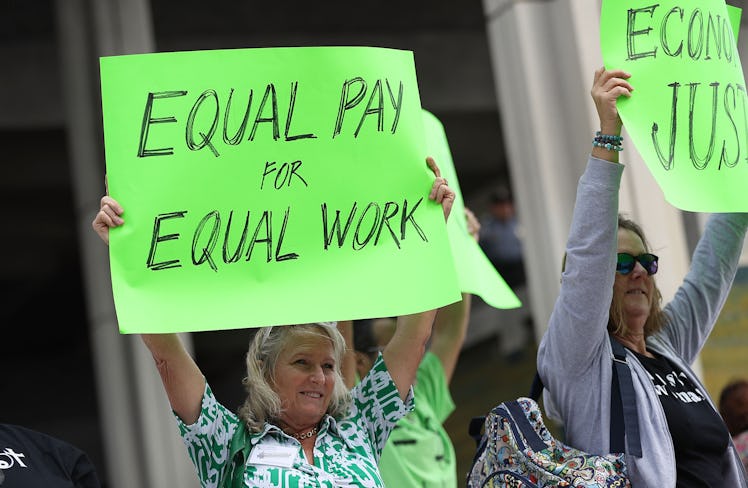
The Trump Admin Ended Obama’s Equal Pay Policy — & Now They're Being Sued
Equal pay for equal work — it's been a rallying cry for feminists for nigh on a century. And despite the Equal Pay Act of 1963, Title VII of the Civil Rights Act, 2009's Lily Ledbetter Equal Pay Act, and many more attempts in between, there is still a wage gap for women, and especially for people of color. Which is why two labor advocacy groups have filed a lawsuit over Donald Trump's equal pay provision rollback.
On Nov. 15, Democracy Forward and the National Women's Law Center (NWLC) sued the Trump administration for rolling back an Obama-era provision meant to collect data and better equip the government to fight the gender and race wage gap. The lawsuit argues that the administration's decision is discriminatory — and illegal.
In a press release, Emily Martin, NWLC General Counsel and Vice President for Workplace Justice, called out the administration's rollback:
If it wasn’t clear before, it’s crystal clear now: women — and the families relying on women’s paychecks — are at the bottom of the Trump Administration’s agenda. By stopping the equal pay data collection, this Administration has shown that its loyalties lie with corporate employers who want to hide pay discrimination under the rug. We will not allow this to go unchallenged.
The suit names the Office of Management and Budget (OMB), the Equal Employment Opportunity Commission (EEOC), and government officials associated with the offices as defendants. Neither the OMB nor the EEOC immediately responded to Elite Daily's requests for comment on the lawsuit.
In Jan. 2016, then-President Barack Obama signed an executive order aimed at closing the wage gap. The rule, which did not need congressional approval, would have required companies with 100 employees or more to report wage data broken down by gender, race, and ethnicity. According to The Atlantic, the data would then be jointly published by the EEOC and the Dept. of Labor.
The rule additionally would have given the EEOC what the Chicago Tribune described as "more reach in its efforts to investigate firms with glaring pay disparities" including filing discrimination lawsuits. Slated to go into effect in March 2018, the executive order was meant to promote transparency, incentivize wage gap analysis, and ultimately work towards closing the wage gap.
But, according to the Wall Street Journal, in August, the OMB decided to eliminate the rule, calling it "unnecessarily burdensome." OMB Office of Information and Regulatory Affairs Administrator Neomi Rao sent a memo to the EEOC, stating that,
Among other things, OMB is concerned that some aspects of the revised collection of information lack practical utility, are unnecessarily burdensome and do not adequately address privacy and confidentiality issues.
This is a sentiment that was echoed by first daughter and Special Adviser to the President Ivanka Trump, a women's empowerment spokesperson who has discussed closing the wage gap in the past. In a statement on the decision, she said, "Ultimately, while I believe the intention was good and agree that pay transparency is important, the proposed policy would not yield the intended results."
And while the EEOC's Acting Chair Victoria Lipnic released a statement shortly after the August announcement ensuring that the EEOC would continue to fight for fair wages, the NWLC and the Labor Council for Latin American Advancement (the advocacy groups suing the Trump administration with Democracy Forward's help) aren't so sure.
In fact, the Democracy Forward suit states that the real burden upon Americans lies in the wage gap — and OMB's decision interferes "with the EEOC's ability to enforce the nation's civil rights laws."
The planned data collection was especially important, per the suit:
[A] dearth of comparative salary and wage information may contribute to the persistence of race and gender pay gaps, and limit attempts to remedy them. Indeed the most recent survey data available indicates that about 60 percent of workers in the private sector are either prohibited or discouraged from discussing their pay with their colleagues. As a result, employees face significant obstacles in gathering the information that would indicate they have experienced pay discrimination, which undermines their ability to challenge such discrimination.
Ultimately, the suit argues, reversing this policy discourages the government from enacting civil rights laws — and, they claim, the move is also illegal per the Administrative Procedures Act, which requires public comment, or, at the very least, careful review. (This is also one of the core arguments of other suits against the Trump administration, such as Massachusetts Attorney General Maura Healey's suit over the birth control mandate roll-back.)
Ultimately, it's difficult to understand exactly why the OMB rolled back the provision before it even took effect, aside from vague concerns about the efficacy of data collection. Maybe this lawsuit will bring some clarity.